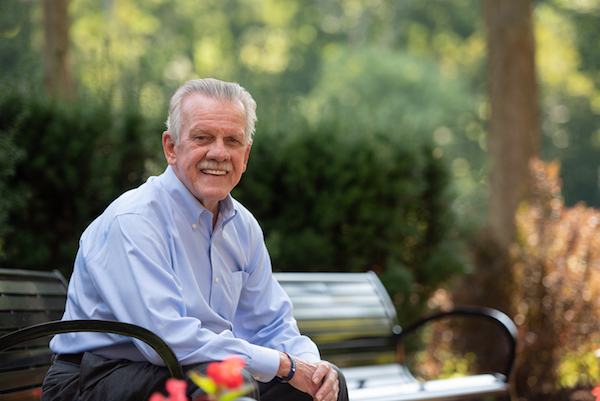President's Blog: From the Heart

Blessed Are the Peacemakers
By Eric F. Spina
More than half a century later John "Jack" Meagher '63 still carries the emotional scars from his tour of duty in Vietnam.
In my conversations with the retired Montgomery County Common Pleas Court judge, I have felt his genuine respect for the sacrifices of veterans as he devotes his life to reconciliation, healing, and peacemaking. It's not unusual for veterans, like Jack, to come home from military action and become steadfast advocates for peace. They’ve seen firsthand the horror of war.
That's why the Brooklyn native has committed $100,000 to the University of Dayton's Human Rights Center to fund a major research project and symposium on the topic, "Transitional Justice, Advocacy, and the U.S.-Vietnam War." What better place to hold such a gathering than on a Catholic, Marianist campus through a center that advances justice and promotes respect and dignity for all persons through education and research on and for advocacy? The center has retained a focus on dialogue, peace, and non-violence throughout its human rights work.
Dr. Paul Morrow, a political philosopher who taught and served three years as a postdoctoral fellow at the University of Virginia, has been named the John M. Meagher Human Rights Fellow. He will work with Dr. Benjamin Schrader, author of Fight to Live, Live to Fight: Veteran Activism After War, to produce new scholarship that shines a spotlight on the impact and legacy of a war on American society and beyond that generations of college students only know from the history books, and many, sadly, have largely forgotten.
Jack will never forget. A history major, he — and his peers — participated in ROTC and graduated from UD as commissioned officers in the U.S. Army. He earned a law degree from the University of Cincinnati before he was stationed in Germany, then Vietnam.
“It is important to me that we return, heal some wounds, acknowledge our past, and make it right,” says Jack, a member of Veterans for Peace, who will make his second trip back to Vietnam in September. He will visit Agent Orange victims, meet with U.S. and Vietnamese veterans, visit an orphanage he helped build in 1968 and tour Hanoi, Ho Chi Minh City and other sites, including Dang Ha where in 1995 he spent five weeks working hand in hand with Vietnamese locals to demine an area, plant 6,000 trees and start a Mine Education Center.
At heart, Jack is a mediator, a reconciler, a peacemaker. After serving on the bench as either a judge or visiting judge for nearly 25 years, he mediated nearly 2,000 cases in Dayton and the San Francisco Bay area, where he now lives. He continues to support the Dayton Peace Museum, a partner of the Human Rights Center.
But it’s clear to those who know his personal story that a piece of his heart lingers with the children of Vietnam — some of whom he’s quietly helped educate — and with his comrades from the front line.
In 1986, Jack helped raise funds to create the Vietnam Veterans Memorial Park in Dayton to honor those who selflessly served, particularly the 401 local men who died in combat. In 1982, he traveled to Washington, D.C. to march with thousands of other veterans to the dedication of the Vietnam Veterans Memorial, a black-granite wall filled with the names of 57,939 Americans who died during the war. When the U.S. re-established diplomatic ties with Vietnam in 1995, the retired U.S. Army captain jumped at the chance to be part of the first delegation to visit the country.
Jack possesses one of the biggest hearts of anyone I’ve ever met. He’s invested his heart — and resources — into the art of reconciliation in a way that honors his comrades in arms and the sacrifices they made while calling for healing and justice.
It’s a lesson in how to find peace.
